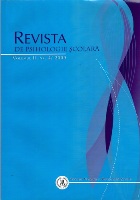Geneza culturală a creativităţii: o paradigmă în ascensiune
The cultural genesis of creativity: An emerging paradigm
Author(s): Vlad Petre GlăveanuSubject(s): Psychology
Published by: Editura Universitatii din Oradea
Keywords: cultural psychology of creativity; representational space; symbolic function; ontogenesis; play; Winnicott
Summary/Abstract: The aim of this paper is to discuss different approaches to creativity and underline the cultural nature of its genesis. Biological genius (“He-paradigm”) and psychological-individualistic (“I-paradigm”) standpoints are contrasted with social and cross-cultural ones (“We-paradigm”) and the cultural psychology of creativity is introduced and positioned. This emerging paradigm, drawing from social and cultural psychology, emphasises the contextual and generative nature of creative acts and employs a person (creator) – other (community) – new artefact (creation) – existing artefacts (culture) model. Creativity is conceptualized as a complex process that leads to the generation of new artefacts by working with “culturally-impregnated” materials within a representational space. One of the central issues addressed by the cultural psychology of creativity is the problem of “genesis” or how creativity is developed and manifested within cultural settings. The pioneer in this field is undoubtedly D.W. Winnicott who asserted at the beginning of the 70’s that creativity and cultural experience are twin-born in the “third” or “potential” space. The final part of the paper will develop further this account and show how creativity emerges from early childhood within a symbolic space where children “play” with artefactual resources, a space of dialogue between self and significant others.
Journal: Revista de Psihologie Şcolară
- Issue Year: 2009
- Issue No: II - 4
- Page Range: 50-63
- Page Count: 14
- Language: English

